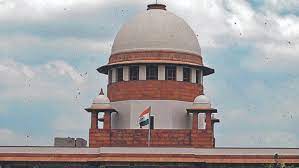Whereby the High Court has reversed the order of acquittal of the Trial Court dated 30.10.2018 and convicted the appellant-accused for the offence punishable under Section 302 of the Indian Penal Code, 1860 ( for short ‘IPC’) and sentenced him to undergo simple imprisonment for life. (Para 1)
The Trial Court considered the matter within the ambit of Section 84 of IPC and on the basis of material on record concluded that the appellant-accused was incapable of knowing the nature of his acts by reason of unsoundness of mind and it is highly probable that he was unaware of what he was doing was either wrong or contrary to law. The Trial Court, thus, acquitted the appellant-accused against which the State of Sikkim preferred an appeal which stands allowed by the impugned judgment of conviction and order of sentence dated 24.08.2022 and 05.09.2022 respectively. (Para 4)
When she reached the house of the deceased, she saw the appellant-accused pulling the deceased by his neck. The statements of both the above witnesses have not been demolished or shaken during the crossexamination. (Para 11)
It is also to be seen that after the appellant-accused attacked the deceased by a sharp-edged weapon which was later snatched by PW-1, he was trying to take out the windpipe from the neck of the deceased which was already cut. This action of the appellant-accused was weird and abnormal. This is clearly indicative of the fact that he was suffering from insanity at the time of incident. (Para 18)
It is settled that the judgment of acquittal can be reversed by the Appellate Court only when there is perversity and not by taking a different view on reappreciation of evidence. If the conclusion of the Trial Court is plausible one, merely because another view is possible on reappreciation of evidence, the Appellate Court should not disturb the findings of acquittal and substitute its own findings to convict the accused. (Para 24)
High Court had reversed the finding of acquittal and convicted the appellant mainly on reappreciation of evidence by holding that the Trial Court erred in extending the benefit of Section 84 of IPC, without even recording a finding that the Trial Court’s finding is perverse. (Para 25)
In the light of the evidence discussed by the Trial Court including the medical evidence about the mental illness of the appellant-accused and his abnormal behaviour at the time of occurrence, it does not appear that the view taken by the Trial Court was perverse or that it was based on without any evidence. We are, therefore, of the view that the High Court erred in setting aside the judgment of acquittal rendered by the Trial Court. (Para 26)
SUPREME COURT OF INDIA
2023 STPL(Web) 267 SC
[2023 INSC 826]
Rupesh Manger (Thapa) Vs. State Of Sikkim
Criminal Appeal Nos. 2069-2070 of 2022-Decided on 13-9-2023
https://stpllaw.in/wp-content/uploads/2023/09/2023-STPLWeb-267-SC.pdf







